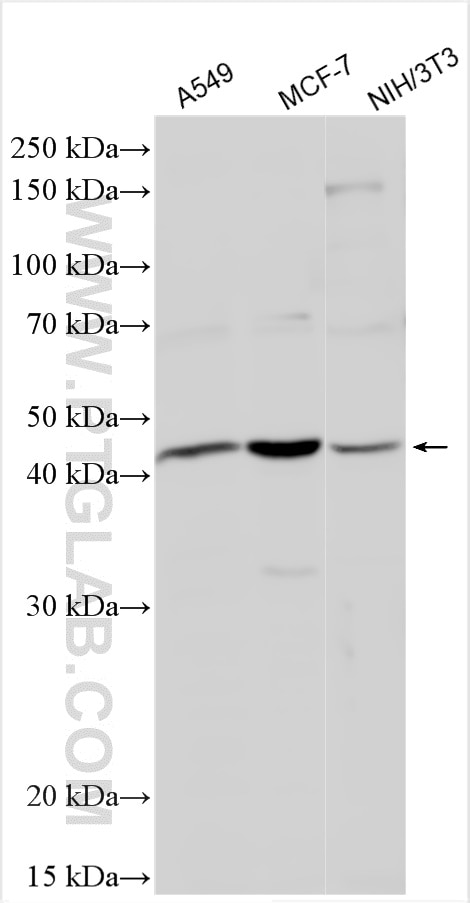PRKX/PRKY Polyklonaler Antikörper
PRKX/PRKY Polyklonal Antikörper für WB, ELISA
Wirt / Isotyp
Kaninchen / IgG
Getestete Reaktivität
human, Maus
Anwendung
WB, ELISA
Konjugation
Unkonjugiert
Kat-Nr. : 17985-1-AP
Synonyme
Galerie der Validierungsdaten
Geprüfte Anwendungen
| Erfolgreiche Detektion in WB | A549-Zellen, MCF-7-Zellen, NIH/3T3-Zellen |
Empfohlene Verdünnung
| Anwendung | Verdünnung |
|---|---|
| Western Blot (WB) | WB : 1:500-1:2000 |
| It is recommended that this reagent should be titrated in each testing system to obtain optimal results. | |
| Sample-dependent, check data in validation data gallery | |
Produktinformation
17985-1-AP bindet in WB, ELISA PRKX/PRKY und zeigt Reaktivität mit human, Maus
| Getestete Reaktivität | human, Maus |
| Wirt / Isotyp | Kaninchen / IgG |
| Klonalität | Polyklonal |
| Typ | Antikörper |
| Immunogen | PRKX/PRKY fusion protein Ag12404 |
| Vollständiger Name | protein kinase, Y-linked |
| Berechnetes Molekulargewicht | 277 aa, 32 kDa |
| Beobachtetes Molekulargewicht | 41 kDa |
| GenBank-Zugangsnummer | BC074852 |
| Gene symbol | PRKY |
| Gene ID (NCBI) | 5616 |
| Konjugation | Unkonjugiert |
| Form | Liquid |
| Reinigungsmethode | Antigen-Affinitätsreinigung |
| Lagerungspuffer | PBS mit 0.02% Natriumazid und 50% Glycerin pH 7.3. |
| Lagerungsbedingungen | Bei -20°C lagern. Nach dem Versand ein Jahr lang stabil Aliquotieren ist bei -20oC Lagerung nicht notwendig. 20ul Größen enthalten 0,1% BSA. |
Hintergrundinformationen
PRKY is a member of the cAMP-dependent serine-threonine protein kinase gene family, which appears to encode a protein related to the catalytic subunit of the cAMP-dependent protein kinases, which are key players in the cellular responses to the second messenger cAMP. A chromosomal aberration involving PRKY is a cause of sex reversal disorder. As a homolog with PRKX, the antibody can recognize endogenous levels of PRKY and PRKX.
Protokolle
| Produktspezifische Protokolle | |
|---|---|
| WB protocol for PRKX/PRKY antibody 17985-1-AP | Protokoll herunterladen |
| Standard-Protokolle | |
|---|---|
| Klicken Sie hier, um unsere Standardprotokolle anzuzeigen |


